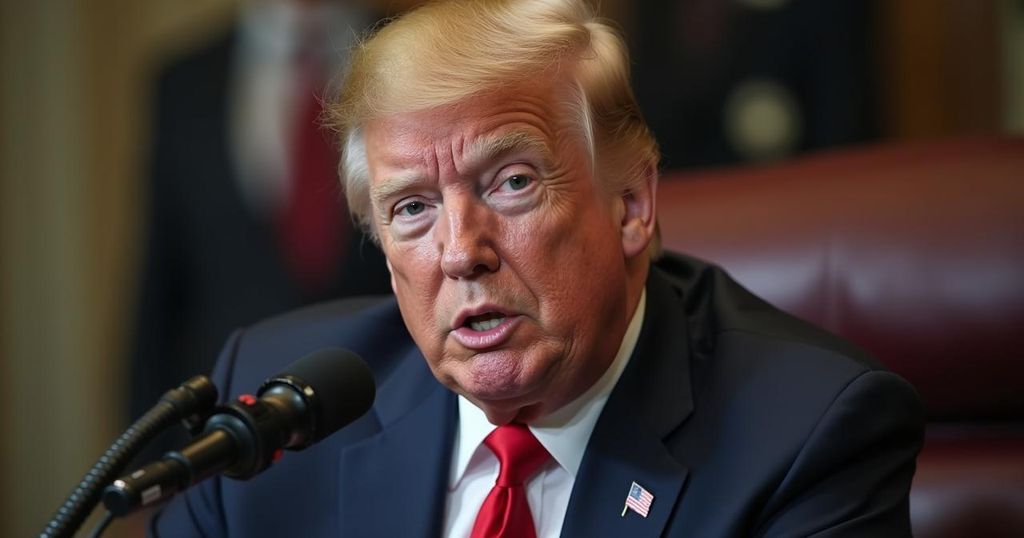Trump’s Plans for Military Use at Home: A Potential Second Term Reimagining
Donald Trump, during his first term, expanded the military’s role in domestic matters and aims to intensify this approach if re-elected. He proposes moving troops to the U.S.-Mexico border for immigration control and civil unrest management. This shift raises significant concerns about the military’s involvement in domestic policy and civil liberties, as Trump leverages a heightened sense of urgency surrounding immigration and crime.
In his first term, former President Donald Trump pushed the boundaries of military deployment within the United States, utilizing military personnel for varied domestic policy initiatives. Should he secure a second presidential term, Trump intends to escalate these measures significantly, transforming the military into a predominant domestic policy instrument. He has articulated plans to relocate thousands of service members from overseas to bolster military presence at the U.S.-Mexico border and has suggested using military resources for complex issues like immigration enforcement and managing civil unrest. Trump’s rhetoric has intensified during the campaign, with alarming language describing cities overrun by crime and implying a need for military intervention against perceived domestic threats. For instance, at a rally in Colorado, he described Aurora as a “war zone” under attack by criminal organizations: “I will rescue Aurora and every town that has been invaded and conquered,” he claimed, reinforcing a narrative that aligns with his proposed military strategies. In interactions with media, Trump has repeatedly categorized his adversaries, including members of Congress, as threats. He has ominously referred to these groups as the “enemy from within,” suggesting a rationale for military action against dissenters. Moreover, Trump is prioritizing a robust response to crime and illegal immigration, indicating that he would utilize the military and National Guard to enforce deportations and confront threats he perceives as domestic. The implications of this proposed shift are profound, as Trump’s plans aim to dissolve traditional constraints on military use within the homeland, a move that has raised concerns among civil liberties advocates. Critics fear that utilizing military force in these capacities may mirror historic abuses of power. Supporters within the Republican Party, buoyed by a shared perception of a “border crisis,” advocate for Trump’s agenda but remain divided regarding the military’s role in enforcement actions. Critics within Congress warn of Trump’s potential overreach concerning military usage, yet many Republicans exhibit a willingness to endorse military solutions for border control and law enforcement, indicating a growing acceptance within the party. Trump’s approach necessitates consideration of existing congressional powers that regulate military deployment, yet in recent cycles, his administration has often circumvented standard military oversight. As Trump continues to navigate the campaign landscape, his proposals reflect a notable departure from traditional military policy, which may provoke escalating tensions both within and outside the GOP.
The article discusses the ambitious military strategies proposed by former President Donald Trump for his potential second term. Since his first presidency, Trump has sought to reshape the military’s role under the premise of national security and immigration control. His plans to deploy military assets domestically, particularly at the U.S.-Mexico border, represent a significant shift from conventional military practices, which have traditionally respected the separations between military engagement and domestic law enforcement. Amid ongoing issues related to immigration and crime, Trump’s proposed policies have sparked debate among lawmakers regarding the implications and boundaries of military power in domestic affairs.
In summary, Donald Trump’s military strategies represent a radical reinterpretation of its role in U.S. domestic policy. His intentions to strengthen military presence at the border and employ troops for law enforcement initiatives have elicited sharp responses across the political spectrum. As the campaign progresses, it remains to be seen how these proposals will be received by both the electorate and Congress, highlighting a pivotal intersection between national security, immigration policy, and military ethics.
Original Source: apnews.com








Post Comment